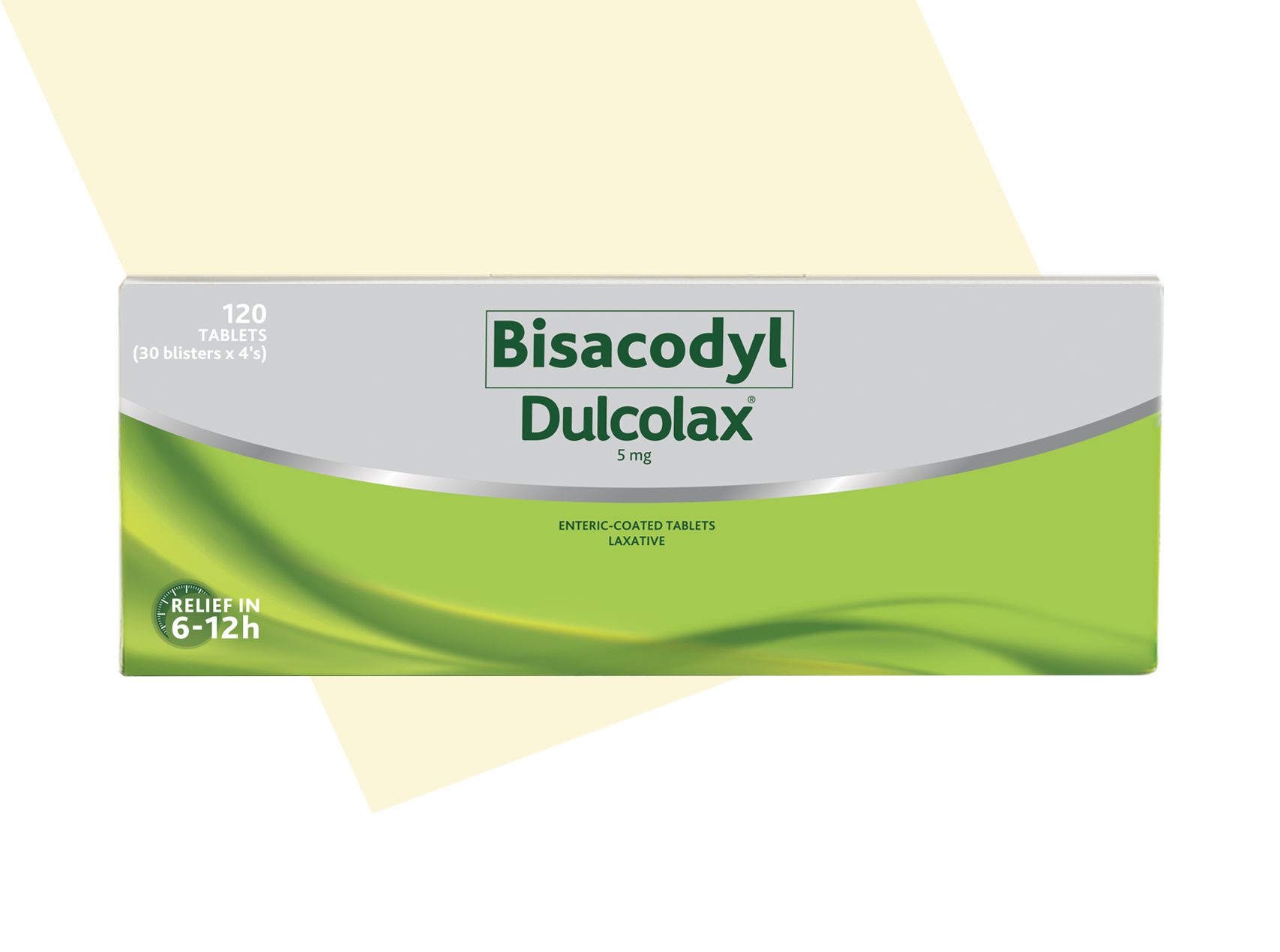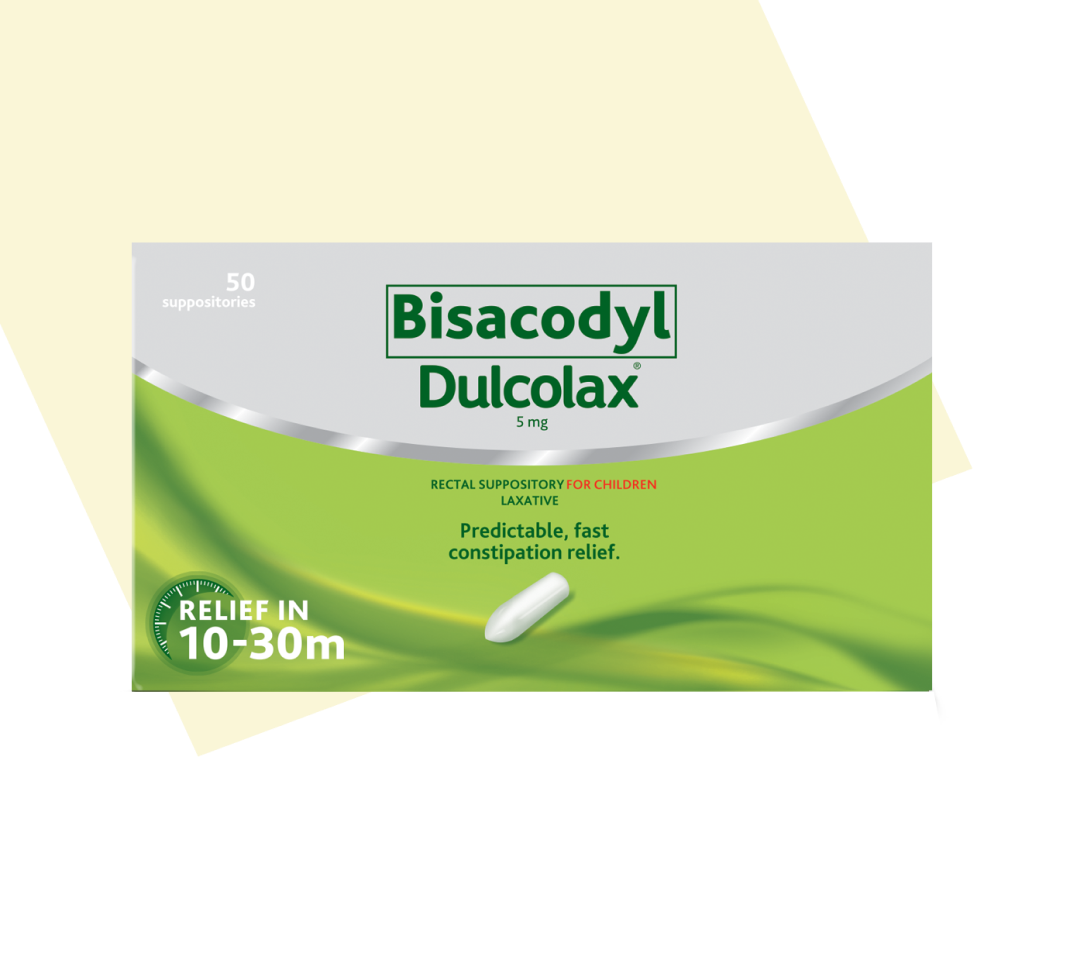Dulcolax® Tablets benefits
Relieves constipation related symptoms
Rehydrates and softens your stools to ease evacuation2
Overnight relief (between 6-12 hours)
Provides relief in a predictable timeframe vs natural remedies such as tea, fruits and water.
Local action thanks to the tablets being coated
Acts directly in the colon thanks to gastro-resistant layers
Works naturally with your body
Relief in the morning is synchronized with the body clock to support your natural gut rhythm
Use and dosage
Dulcolax® Tablets are recommended to be taken at night with a glass of water (swallowed not chewed). It should not be taken together with products which reduce the acidity of the upper gastrointestinal tract, such as whole milk products, antacids (e.g. bicarbonate) or proton pump inhibitors.
Children 4 - 10 years::
- 1 tablet per day
Adults and children older than 10 years:
- 1 to 2 tablets per day (it is recommended to start treatment with 1 tablet per day)
Pregnant women:
- consult a doctor
Suitable for Diabetics and Celiacs
What is in the product?
Bisacodyl
Bisacodyl has a dual action: it stimulates the smooth muscles of the intestinal walls and increases the water content, which helps to soften the stool, favoring evacuation. Thanks to a formula which allows the coating to dissolve only at colon level, thus the action takes place where it’s needed.

How does it work?
Once the tablet has been swallowed, the stimulant laxative bisacodyl will accelerate the stool transit through the colon with its dual action: the rehydration of the stools in the large intestine which makes them soft and easier to pass, and the stimulation of the bowel muscles causing the intestine to contract. You can then expect an effect within 6 to 12 hours.1
In addition, the gastro-resistant coating of the tablets ensures that the active content is released exactly where it is needed – directly in your constipated colon. The active metabolite is minimally absorbed, so there is no burden to the body.
Frequently asked questions
When you start talking about constipation, the same questions often pop up.
-
It is a stimulant laxative with local dual action recommended for adults and children 4 years and above experiencing occasional constipation. It is an overnight relief laxative that will stimulate bowel movements, accelerate transit of stools and facilitate evacuation within 6-12 hours.
-
It is for reliable constipation relief for adults and children 4 years of age and older. Children aged 10 years or younger and patients with chronic or persistent constipation should only be treated under the guidance of a physician.1
-
Long experience has shown no evidence of undesirable or damaging effects during pregnancy and breastfeeding. But data from adequate clinical studies in pregnant women are lacking. Therefore, during pregnancy and lactation, the product should only be taken under medical advice and the direct supervision of a doctor.1
-
It should not be taken on a continuous daily basis or for extended periods without your doctor investigating the cause of constipation. Prolonged excessive use may lead to fluid and electrolyte loss and potassium deficiency. Laxatives should be used for no more than 7 days, as infrequently as possible (with a maximum of 2 take per day for adults, 1 for children under 10). For longer usage, please consult your doctor.
-
The recommended dose for adults older than 10 years is 1 – 2 tablets per day.
It is recommended to start treatment with the low dose (1 tablet). The dose may be adjusted up to 2 tablets to produce regular stools.
Children 10 years of age or younger should only take 1 tablet per day.
-
The tablet should be taken (swallowed and not chewed) in the evening before going to bedtime to expect an overnight effect in the morning (it will take between 6-12 hours to act, depending on people). The coated tablets should not be taken together with products which reduce the acidity of the upper gastrointestinal tract, such as milk, antacids or proton pump inhibitors.
-
Like any medicine, it can have side effects although not everybody gets them. The most common side effects are abdominal pain and diarrhea. If you experience side effects, please stop taking the medicines and see your doctor right away.
-
Dulcolax® Tablets should not be taken by people who are allergic to the active substance (bisacodyl) or to any of the other ingredients in the product.
Dulcolax® Coated tablets are not suitable for anyone who is intolerant to or cannot digest some sugars (as the tablet contains a small amount of lactose and sucrose).
Also do not take Dulcolax® Coated Tablets if:
- You have severe dehydration
- You have a bowel condition called “ileus” (blockage in the intestine)
- You have a serious abdominal condition such as appendicitis
- You have severe abdominal pain with nausea and vomiting
- You have a blocked bowel (intestinal obstruction)
- You have inflammation of the bowel (small or large intestine) subject to hereditary conditions incompatible with its active substance or any of the other ingredients.
-
Dulcolax® Coated tablets can be purchased in pharmacies and parapharmacies.
-
There are many types of laxatives – each works somewhat differently to make it easier to have a bowel movement.
Stimulant laxatives
Stimulant laxatives including bisacodyl, the active substance in Dulcolax®, has a dual action: Stimulant laxatives induce water and salt transport into the gut which hydrates the stool and makes it easier to pass. In addition, stimulant laxatives stimulate the activity of bowel muscles causing your intestines to contract. These two effects jointly result in an acceleration of stool transit through the colon and have been proven to be very effective and safe in clinical studies. Effectively stimulating the bowel muscles speed up stool movement. They help get things moving.
Stool Softeners laxatives
Stool softeners are just that — products that help make hard, dry, painful stools softer. They work by softening the stool in the intestine, which makes it easier and more comfortable to pass. When used as directed, stool softeners are a safe, gentle way to keep things moving.
Suppositories laxatives
Medicated suppositories are a typically reliable fast-acting dosage form of stimulant laxatives that are inserted into the rectum. These suppositories which may contain bisacodyl or glycerin aid in moving stool out of the body by providing lubrication and stimulation. They stimulate the bowel muscles in the intestine to help encourage a bowel movement quickly within minutes.
Fiber supplements
Fiber supplements add bulk to your stool. Bulky stools are softer and easier to pass. Fiber supplements are traditionally considered as the first-line treatment. They are generally safe, but may increase bloating, flatulence and abdominal pain, and may interfere with the absorption of some drugs.Osmotic laxatives
Osmotic or saline laxatives help stool move through the large intestine by reducing intestinal fluid absorption. These laxatives contain poorly absorbed substances that hold additional water inside the colon, creating an osmotic gradient, drawing water into the bowel. This hydrates the stool and makes it easier to pass. Saline laxatives can also help increase the number of bowel movements. An easier time in the bathroom and regular bowel movements? It’s a win-win.
-
Dulcolax® products, and any other laxatives, do not help with weight loss. They do not reduce the absorption of calories or nutrients. They can cause watery stools (diarrhea), abdominal cramps and dehydration.
-
When taking laxatives, side effects can occur during short and long-term treatments (as for any medication). As of today, there is no proof of a specific risk to the stomach or colon during long-term laxative treatments. Based on experience, stimulant laxatives can be considered safe for prolonged use if used as indicated in the patient information/leaflet.
If high doses are taken over extended periods of time, watery stools (diarrhea), abdominal cramps and a clinically significant loss of fluid, potassium and other electrolytes can occur which can damage your health by causing disturbances of electrolyte and mineral balances. Sodium, potassium, magnesium, and phosphorus are electrolytes and minerals that are present in very specific amounts necessary for proper functioning of the nerves and muscles, including those of the colon and heart. Upsetting their balance can cause incorrect functioning of these vital organs. Kidney damage and muscle weakness have also been described in association with chronic laxative abuse.1
-
Available data do not indicate a risk for habituation or addiction4, 5. Some people suffering from constipation symptoms need to use laxatives constantly to maintain bowel movements without complaints. These individuals with chronic constipation do not achieve regular bowel movements without complaints such as severe straining. However, this constant use is not the result of prior laxative intake. It is rather their condition causing the need for constant use and this should not be misinterpreted as addiction.
For these patients, medical supervision is essential to ensure safe usage of laxatives, and diagnostic procedures may be necessary to identify underlying conditions contributing to chronic constipation. Addiction does not have a pharmacological basis because most laxatives are not absorbed, and none cross the blood brain barrier which means that they do not reach the brain to cause physical addictio4, 5.
Dulcolax® range of solutions
Dulcolax® products help your digestive system get moving, with different reliefs available: overnight relief and fast relief so you can feel good inside and out!
Stay informed
Constipation symptoms such as bloatedness, gassiness and hard dry stool can be extremely bothersome and persistent. Because we know how frustrating and stressful these periods can be, we can help identify the causes for constipation and how to prevent it.
- Opella. Company Core Data Sheet (CCDS) Dulcolax® Coated Tablets. 2017.
- Kamm, M. A. et. al. Oral bisacodyl is effective and well-tolerated in patients with chronic constipation. Clin.Gastroenterol.Hepatol. 2011; 9(7):577-583.
- Kienzle-Horn S, Vix JM, Schuijt C, Comparison of bisacodyl and sodium picosulfate in the treatment of chronic constipation. Curr Med Res Opin 2007;23:891-9
- Bellini M, Gambaccini D, Usai-Satta P, De Bortoli N, Bertani L, Marchi S, Stasi C. Irritable bowel syndrome and chronic constipation: Fact and fiction. World J Gastroenterol. 2015 Oct 28;21(40):11362-70.
- Müller-Lissner SA, Kamm MA, Scarpignato C, Wald A. Myths and misconceptions about chronic constipation. Am J Gastroenterol. 2005 Jan;100(1):232-42.






